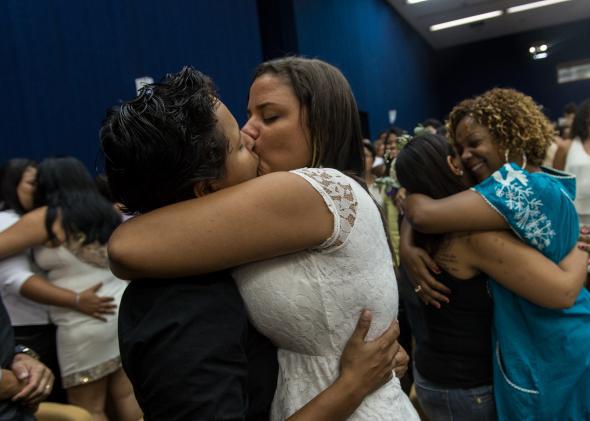As recently as 2011, I was still in the habit of telling people that I was against gay marriage. In my mega-liberal home state of Massachusetts, it felt like a lark to be the lesbian in favor of civil unions. “It’s not that I think we should give marriage back, now that we have it here,” I’d say, “but really, who cares about a word? If they want to keep the word, why not just let them have it?”
Marriage always seemed to me to be so lame, so totally dull and unsexy that to fight earnestly on its behalf was almost embarrassing. It seemed to me that one of the main perks of lesbianism was not having to follow the same rules as other people about what constituted a successful relationship. Even after the Goodridge decision made marriage a possibility, I continued to assume that it would never affect me one way or the other. It helped, perhaps, that I had yet to enter a relationship that lasted longer than a year—but a life of writing, travel, and serial monogamy sounded far more exciting than finding some other person to drag around for an entire lifetime.
My fiancée reports having quite similar feelings about the potential dreariness of marriage vs. the excitement of singletude, although she’s young enough not to have linked her gayness with freedom from having to marry the way I did. Like me, she was always more passionate about her work (in her case, it’s the study of insects, particularly vectors of infectious diseases) than her romantic partnerships. Also like me, she continues to have reservations about the institution of marriage and is a bit ambivalent about contributing to the expansion of it, despite being a far more consistent supporter of marriage equality than I ever was. Nevertheless, together we’re ignoring June Thomas’ advice not to become wives and going forward anyway.
For two people who want to combine our lives and someday have a family, it just makes practical sense to do so in the way that has been sanctioned by our culture and our government. Just today, we found out that being married is going to save us $50 and some paperwork, since we’ll only have to fill out one application, not two, to move into our new apartment. This in Tennessee, where the manager would be legally allowed to discriminate against us for our orientation and where the status of gay couples married in other states remains in limbo. LGBTQ people like us are changing the institution of marriage, but it’s also changing what it means to be gay or lesbian. Like it or not, on May 10, when we stand up in front of all our friends and family and say “I do,” we will be aligning ourselves with a traditional view of romantic couples as the stable unit that communities and families are built of. It’s a tradeoff that both of us feel slightly uneasy about, despite our love and commitment to each other.
That’s not to say we’re not attempting a bit of on-the-fly updating of tradition, particularly as it relates to gender roles. I’ll be wearing a tux for the ceremony (as will my sister, who gamely agreed to it as a condition of her serving as a groom’s person), walking down the aisle with my father, and then dancing with my mother at the reception. I’m also changing my last name to my fiancée’s. (We want to be sure we’ll both share a last name with any children we may have.) This has confused some friends and family members, who assumed I would always take the male role in our relationship. All this is likely to seem awfully radical to some of the religious and conservative family members who will be in attendance, a few of whom continue to oppose same-sex marriage politically. Their RSVPs are tangible evidence of how completely the culture is shifting toward LGBTQ acceptance.
My fiancée and I are facing a challenge that’s similar, in some ways, to the one faced by our more conservative wedding guests. We’re both being changed by a new cultural reality in ways that can feel uncomfortable and strange, and we’re both going to have to reconcile our values with those of the culture we’re embedded in. She and I have pledged to resist dullness and conformity, to stay open to new adventures, and to always put our individual careers before our marriage. Still, let’s face it: We may end up becoming just another dull, suburban, married couple—although my fiancée and all the insects she’s storing in our freezer beg to differ.
